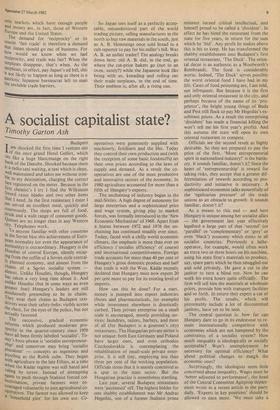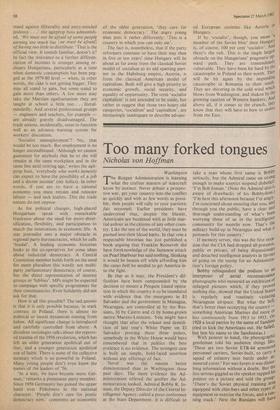A socialist capitalist state?
Timothy Garton Ash
To anyone familiar with other countries In the Soviet bloc this achievement of Euro- pean normality (or even the appearance of normality) is extraordinary. Hungary is the oudini of central Europe, silently escap- ing from the coffin of a Soviet-style central- IY Planned economy, and almost from the chains of a Soviet socialist system — a,hrlost. Unlike Houdini, though, Hungary has taken a very long time about it. And unlike Houdini (but in some ways an even greater feat) Hungary's leaders are still assiduously pretending to be in chains. 'rile), wear their chains as Budapest taxi- drivers wear their safety-belts: visibly across the chest, for the eyes of the police, but not actually fastened. The successive, gradual economic reforms which produced moderate pro- sperity in the quarter-century since 1956 have all been firmly labelled 'socialist'. To- day's buzz-phrase is 'socialist entrepreneur- shiP' and tomorrow may bring 'socialist Pluralism' — concepts as ingenious and Puzzling as the Rubik cube. They began with agriculture in the late Fifties, at a time when the Kadar regime was still hated and ruling by terror. Instead of attempting again to push through Stalinist forced col- lectivisation, private farmers were en- couraged voluntarily to join agricultural co- operatives. The farmer was allowed to keep a 'household plot' for his own use. Co-
operatives were generously supplied with machinery, fertilisers and the like. Today they control their own production and (with the exception of some basic foodstuffs) set their own prices according to the laws of supply and demand. As a result the co- operatives are one of the most productive and innovative sectors of the economy. In 1980 agriculture accounted for more than a fifth of Hungary's exports.
The unchaining of industry began in the mid-Sixties. A high degree of autonomy for large enterprises and a sophisticated price and wage system, giving play to market forces, was formally introduced in the 'New Economic Mechanism' of 1968. Apart from a hiatus between 1972 and 1976 the un- chaining has continued steadily ever since. Today, faced with a chilly world economic climate, the emphasis is more than ever on efficiency ('socialist efficiency' of course) and international competitiveness. Foreign trade accounts for more than 40 per cent of Hungary's gross domestic product and half that trade is with the West. Kadar recently declared that Hungary must now export 20 per cent more to pay for its existing level of imports.
How can this be done? For a start, money is pumped into export industries (buses and pharmaceuticals, for example) while investment elsewhere is drastically curbed. Then private enterprise on a small scale is encouraged, mostly providing ser- vices: laundries, tailors, barbers, and most of all (for Budapest is a gourmet's city) restaurants. The Hungarian private sector is not unique: both East Germany and Poland have larger ones, and even orthodox Czechoslovakia is contemplating the rehabilitation of small-scale private enter- prise. It is still tiny, employing less than three per cent of the working population. Officials stress that it is mainly conceived as a spur to the state sector. But the Hungarian practice is nonetheless startling.
Last year, several Budapest restaurants were 'auctioned' off. The highest bidder for one shabby establishment was Mr Andras Hegedus, son of a former Stalinist prime minister turned critical intellectual, and himself proud to be called a 'dissident'. In effect he has hired the restaurant from the state for five years, in return for the sum which he 'bid'. Any profit he makes above this is his to keep. He has transformed the shabby establishment into Budapest's first oriental restaurant, 'The Duck'. The orien- tal decor is as authentic as a Woolworth's Rembrandt. The food is considerably worse. Indeed, 'The Duck' serves possibly the worst oriental food I have had in my life. Cases of food poisoning are, I am told, not infrequent. But because it is the first and only oriental restaurant in the city, and perhaps because of the name of its 'pro- prietor', the bright young things of Buda and Pest still flock to pay Mr Hegedtis's ex- orbitant prices. As a result the enterprising 'dissident' has made a financial killing (he won't tell me his first year's profit). And this autumn the state will open its own oriental restaurant to compete.
Officials see the second result as highly desirable. So they are prepared to pay the price of the first. 'More entrepreneurial spirit in nationalised industry!' is the battle- cry. It sounds familiar, doesn't it? Since the heart of 'entrepreneurship' is reward for taking risks, they accept that a greater dif- ferentiation of rewards according to pro- ductivity and initiative is necessary. A sophisticated economist talks mournfully of the 'egalitarian pressure' of the trade unions as an obstacle to growth'. It sounds familiar, doesn't it?
As a means to this end — and here Hungary is unique among her socialist allies — the government last year effectively legalised a large part of that 'second' (or 'parallel' or 'complementary' or 'grey' or even 'black') economy which exists in all socialist countries. Previously a lathe- operator, for example, would often work an extra two or three hours on his machine, using his state firm's materials to produce, say, spare parts which he then smuggled out and sold privately. He gave a cut to the janitor to turn a blind eye. Now he can work his extra hours quite officially. The firm will sell him the materials at wholesale prices, provide him with transport facilities and so forth. hi return they expect a cut of his profit. The results, which will presumably include a lot of discontented janitors, have yet to be seen.
The central question is: how far can Hungary dare to go in its endeavour to re- main internationally competitive with economies which are not hampered by the constraints of a socialist system? How much inequality is ideologically or socially acceptable? Won't unemployment be necessary for optimal efficiency? What about political changes to match the economic ones?
Surprisingly, the ideologists seem little concerned about inequality. Wages must be 'better adjusted to performance', the head of the Central Committee Agitprop depart- ment wrote in a recent article in the party daily. 'Experts in key positions' should be allowed to earn more. 'We must take a
stand against illiberality and petty-minded jealousy . . .' the agitprop boss admonish- ed. 'We must not he afraid of some people earning too much but [we must be afraid] of having too little to distribute.' That is the official view. It sounds familiar, doesn't it? In fact the resistance to a further differen- tiation of incomes is stronger among or- dinary Hungarians, particularly at a time when domestic consumption has been peg- ged at the 1979-80 level — when, in other words, the cake is not getting bigger. They may all stand to gain, but some stand to gain more than others. A few more may take the Marxian egalitarianism they are taught at school a little too . . . literal- mindedly. And several professional groups — engineers and teachers, for example — are already gravely disadvantaged. The trade unions, incidentally, seem to function well as an advance warning system for workers' discontent.
`Socialist unemployment'? No, that would be too much. But employment is no longer unconditional. 'Although we cannot guarantee for anybody that he or she will remain at the same workplace and in the same line until retiring age,' writes the agit- prop boss, 'everybody who works honestly can expect to have the possibility of a job and a decent income' (my italics). In other words, if you are to have a rational economy you must retrain and relocate labour — and sack loafers. This the trade unions do not oppose.
As for political changes, high-placed Hungarians speak with remarkable frankness about the need for more diver- sification, flexibility, and participation to match the innovations in economic life. A star journalist sees a major obstacle in regional party bureaucracies, which he calls `feudal'. A leading economic historian looks to the co-operatives for some ideas about industrial democracy. A Central Committee member holds forth on the need for more pluralism (his word): not multi- party parliamentary democracy, of course, but the direct representation of interest groups or 'lobbies'. MPs might be expected to campaign with specific programmes for their constituencies. Even Solidarity did not ask for that.
How is all this possible? The sad answer is that it is only possible because, in stark contrast to Poland, there is almost no political or moral dynamism coming from below. All significant change is introduced and carefully controlled from above. A dissident sociologist talks about the repress- ed trauma of the 1956 revolution, which has left an older generation apolitical out of fear, and a younger generation apolitical out of habit. There is none of the collective =mon/ which is so powerful in Poland. Many young people don't even know the names of the leaders of '56, 'In a way, we have become more Ger- man,' remarks a prominent party member. Since 1956 Germanity has gained the upper hand over Polishncss in the national character. 'People don't care for poetic democracy now,' comments an economist of the older generation, 'they care for economic democracy.' The angry young man puts it rather differently: 'This is a country in which you can only eat'.
The fact is, nonetheless, that if the party reformers continue to have their way then in five or ten years' time Hungary will be about as far away from the classical Soviet model of socialism as its old sparring part- ner in the Habsburg empire, Austria, is from the classical American model of capitalism. Both will give a high priority to economic growth, social security, and equality of opportunity. The term 'socialist capitalism' is not intended to be snide, but rather to suggest that those two hoary old categories, 'socialism' and 'capitalism', are increasingly inadequate to describe advanc- ed European societies like Austria or Hungary.
If by, 'socialist', though, you mean `a member of the Soviet bloc' then Hungary is, of course, 100 per cent 'socialist'. And there's the rub. This is the single largest obstacle on the Hungarians' pragmatic LIP' ward path. They are tremendously vulnerable. They have been hit hard by the catastrophe in Poland to their north. They will be hit again by the impending catastrophe in Romania to their south- They are shivering in the cold wind which blows from Washington, and shaken by the growing caution of Western bankers. And above all, if it comes to the cl-unch, theY know that they will have to bow to orders from the East.





































 Previous page
Previous page